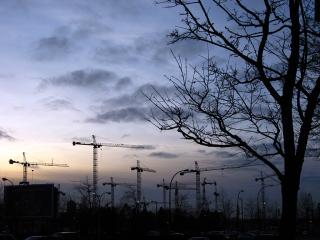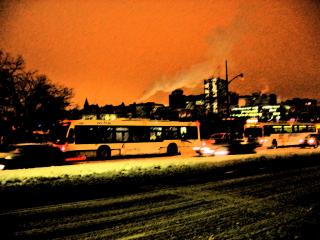After being removed from a reactor, nuclear fuel is both too radioactive and too physically hot to be reprocessed or placed in dry storage. As such, it is kept in cooling pools for a period of five to six years. Given the absence of long-term geologic storage facilities, all of Canada’s high level waste is currently in cooling pools or on-site dry cask storage. On a per-capita basis, Canada produces more high level nuclear waste than any other state – a total of 1,300 tonnes in 2001.
Canada currently has eleven nuclear waste storage facilities. Among these, one is in the process of decommissioning and six contain high level waste. Four sites have waste in dry storage casks: Darlington, Bruce, Pickering, Gentilly, and Point Lepreau. Other facilities include spent fuel pools. According to the Canadian Nuclear Safety Commission (CNSC), all Canadian wastes are currently in ‘storage’ defined as: “a short-term management technique that requires human intervention for maintenance and security and allows for recovery of the waste.”
In 2002, a major review of waste disposal options was undertaken by the Nuclear Waste Management Organization (NWMO). Their final report – released in November 2005 – endorsed a system of “Adaptive Phased Management” employing both interim shallow storage and deep geological storage, with the possibility of future recovery of materials. Such recovery would be motivated either by concerns about leakage potential or a desire to process the fuel into something useful. The NWMO is currently engaged in a process of site selection, intended to lead eventually to a National Nuclear Waste Repository.
The nuclear waste problem
From both an environmental and public support standpoint, the generation of nuclear waste is one of the largest drawbacks of nuclear fission as a power source. Just as the emission of greenhouse gasses threatens future generations with harmful ecological outcomes, the production of nuclear wastes at all stages in the fuel cycle presents risks to those alive in the present and to those who will be alive in the future, across a span of time not generally considered by human beings.
Wastes like Plutonium-239 remain highly dangerous for tens of millennia: a span roughly equivalent to the total historical record of human civilizations. Furthermore, while most states using nuclear power have declared an intention of creating geological repositories for wastes, no state has such a facility in operation. The decades-long story of the planned Yucca Mountain repository in the United States demonstrates some of the practical, political, and legal challenges to establishing such facilities in democratic societies.
Dry cask storage is not an acceptable long-term option, as suggested by its CNSC categorization as “a short-term management technique.” When dealing with wastes dangerous for millennia, it cannot be assumed that regular maintenance and inspection will continue. Storage systems must be ‘passively safe:’ able to contain the wastes they store for the full duration of their dangerous lives, without the need for active intervention from human beings. To date, no such facilities exist.






